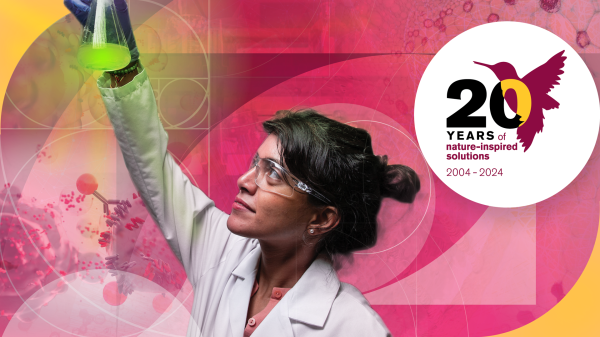ASU researcher wins coveted fellowship from Howard Hughes Medical Institute

Jessica Warren is a postdoctoral researcher in the Biodesign Center for Mechanisms of Evolution.
Jessica Warren has just received a prestigious Hanna H. Gray Fellowship, awarded by the Howard Hughes Medical Institute.
Warren is currently a postdoctoral researcher with the Biodesign Center for Mechanisms of Evolution in the laboratory of John McCutcheon at Arizona State University. The lab’s current research includes exploration of the peculiar living arrangements of endosymbionts — organisms that reside inside other organisms, generally in a mutually beneficial arrangement.
Along with Warren, McCutcheon was also recently recognized for research excellence and selected as one of just 33 Howard Hughes Medical Institute investigators in 2021.
“This is an incredible opportunity from HHMI,” Warren says. “This fellowship gives me the freedom to pursue the scientific questions that I’m so passionate about, and I’m incredibly excited to be a part of this exceptional community of Hanna Gray Fellows.”
Warren studies essential features of plant cells, including chloroplasts — central components in the machinery of photosynthesis. Such structures appear to have begun as endosymbionts following the capture of a cyanobacterium approximately a billion years ago. Her research seeks to understand how the chloroplast’s bacterial structures and genetic features have been integrated into modern plant cells and how this incorporation controls plant development and physiology.
Prior to her arrival at ASU, Warren received her PhD in biological sciences from Colorado State University in 2021. Her fascination with topics in evolution dates from her high school days. Today, she uses methods in algebra, statistics and computational analysis to better understand the molecular basis for organismic change over time. Her concentration is on endosymbionts like chloroplasts as well as the mitochondrial components of eukaryotic cells.
John McCutcheon was recently recognized for research excellence and selected as one of just 33 HHMI investigators in 2021.
The Hanna H. Gray Fellows Program seeks to encourage talented early career scientists who have the potential to become leaders in academic research. In particular, this program aims to recruit and retain emerging scientists who are from gender, racial, ethnic and other groups underrepresented in the life sciences, including those from disadvantaged backgrounds.
Each fellow may receive up to $1.4 million in funding over eight years, with mentoring and active involvement within the Howard Hughes Medical Institute community.
In this two-phase program, fellows will be supported from early postdoctoral training through several years of a tenure-track faculty position.
“I am thrilled that Jess was selected for this very prestigious award, and I look forward to our continued collaboration on all things organelles,” McCutcheon says.
The institute announced the selection of the 25 new Hanna Gray Fellows and their faculty mentors on Aug. 24.
More Science and technology

ASU-led Southwest Advanced Prototyping Hub awarded $21.3M for 2nd year of funding for microelectronics projects
The Southwest Advanced Prototyping (SWAP) Hub, led by Arizona State University, has been awarded $21.3 million in Year 2 funding…

Celebrating '20 Years of Discovery' at the Biodesign Institute
Editor’s note: The Biodesign Institute at Arizona State University wraps up its 20th anniversary with the sixth and final…

Student research supports semiconductor sustainability
As microelectronics have become an increasingly essential part of modern society, greenhouse gas emissions, which are associated…
